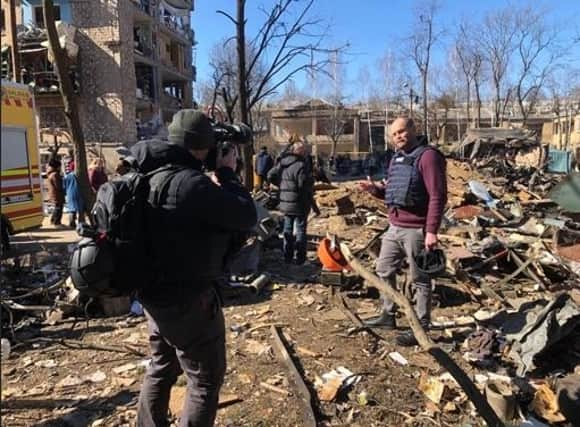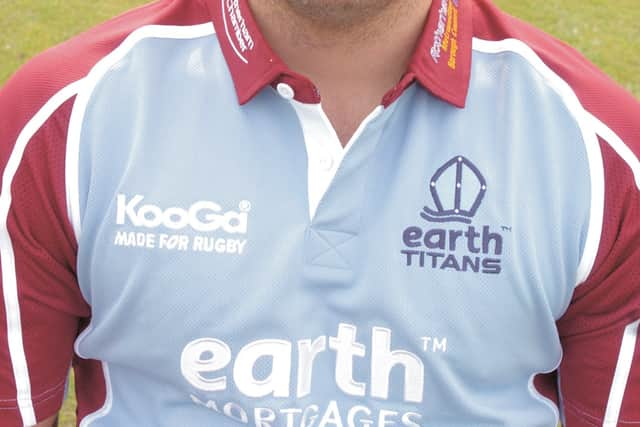From Rotherham Titans' back row to the Ukraine frontline: the amazing journey of BBC Kyiv reporter James Waterhouse


The network’s news team in the capital Kyiv includes James Waterhouse, who was on the books at Rotherham Titans in the mid-2000s, before going on to play for Plymouth and Esher and eventually going into journalism.
He spoke to Michael Upton about the experience of reporting from a war zone and what he remembers from his time as a Titan.
Q: How did you come to be covering the war for the BBC?
Advertisement
Hide AdAdvertisement
Hide AdA: They advertised the job through the BBC because they wanted to try out some new people.
They said: ''We are going to rotate it every three months", so I headed out in the middle of January and found myself very quickly in freezing temperatures — it was a waste of time packing my jogging gear!
I went to my meet colleagues one day and we ended up working 12 hours because of the level of interest in what was then a developing crisis.
It felt extraordinary just to be there, as the tension continued to rise.
Advertisement
Hide AdAdvertisement
Hide AdQ: Did you have any idea you were going to be reporting from the frontline of war?
A: No. It was no more clear when you were out there, as the west was saying one thing but all along the president (of Ukraine) and his government said there was nothing to suggest it (escalation) was going to happen.
Of course, I entertained the idea that it could explode but right up to the first day I could not believe that Russia would do this.
Kyiv was lovely, with so many cafes and places to go out and eat, and it went overnight to a completely different atmosphere where it was just like firework night.
Advertisement
Hide AdAdvertisement
Hide AdI was staying in quite a trendy place but eventually the BBC moved us into another hotel and that is when things became a lot more restricted.
Q: What was it like trying to cope with such a sudden change?
A: You are just trying to keep it simple and do your job — the pace of events was like nothing I have ever seen before.
A big part of the day was the information battle where the Russians were making one claim, and it was being followed by a counter claim.
Advertisement
Hide AdAdvertisement
Hide AdRussia was issuing denials and the UK was putting messages out that would confront this.
With the situation in the southeast, it was very difficult to verify what was going on there.
We were there to bear witness to what we were seeing.
It was important to see the expressions on people’s faces and see how they were feeling about it.
Q: You were working with some highly experienced war reporters. What was that like?
Advertisement
Hide AdAdvertisement
Hide AdA: I remember early on I was sitting round a table with Lyse Doucet and Fergal Keane. They are people I’ve really looked up to for so many years, who have mastered the reporting of global stories while also covering the human side.
Of course, I don’t have the same experience as they do so I was drawing on what I’ve seen in my own ten-year career, to compile as clear a picture as possible.
When you’re in that environment it’s never been more important to just stick to the basics and make it relatable to people.
Q: Were you scared for your own safety at any point, especially when a Sky News team was shot at and some members were injured?
Advertisement
Hide AdAdvertisement
Hide AdA: I did not fear for my safety — a big part of that is the high risk team we had with us that would do everything they could to enable us to do our jobs.
We always had the option if we wanted to leave the area.
We were all deeply concerned when we heard what had happened to (Sky reporter) Stuart Ramsay's team. The high risk guys were aware of it and made sure we were safe but of course it does play on your mind.
Q: What’s it like leaving your family and reporting from a war zone?
A: You're asking a lot of people when you’re doing something like this.
Advertisement
Hide AdAdvertisement
Hide AdIn a way, it is easier to be the one going away and doing the job while for them, they are left behind.
One thing that helps is the constant stream of coverage that made them feel more connected.
It got easier, but that first week was very difficult.


Q: After going to university in Shefield, you played for Rotherham Titans from 2006 to 2009 (above)? What do recall about playing at Clifton Lane?
A: I have fond memories of Clifton Lane, of the crowd being right on top of you, and I cherish my time there.
Advertisement
Hide AdAdvertisement
Hide AdI was training with the likes of Eric Lund and Hendre Fourie, who went on to do great things.
It was a really good experience for a young man completing my studies — a great chance to experience a different part of the world - but it was really tough and attritional play.
Q: During a recent Rotherham Council meeting, one councillor, Michael Bennett-Sylvester, urged colleagues to hold you in their thoughts, saying: “James – once a Titan always a Titan, I know we’ll see you home safe once you’ve concluded what you’re having to do there.” What’s your reaction to that?
A: That’s very moving to hear.
I just think that demonstrates the importance of Rotherham Rugby Club and its value in the community.
I know we all felt the love from the fans and to hear that is quite touching.
I’d like to thank that member in question.